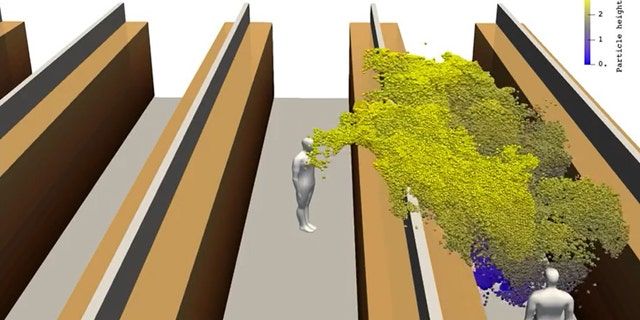No products in the cart.
Get all the latest news on coronavirus and more delivered daily to your inbox. Sign up here.
Researchers in Finland have created a chilling video that models how coronavirus could spread from a single cough in a supermarket.
The video was uploaded to YouTube by scientists at Finland’s Aalto University. “In the 3D model, a person coughs in a corridor bounded by shelves under representative indoor ventilation airflow conditions,” the video explains. “As a result of coughing, an aerosol cloud travels in the air to the corridor. It takes up to several minutes for the cloud to spread and disperse.”
“Preliminary results indicate that aerosol particles carrying the virus can remain in the air longer than was originally thought, so it is important to avoid busy public indoor spaces,” the researchers explain in a statement. “This also reduces the risk of droplet infection, which remains the main path of transmission for coronavirus.”
CORONAVIRUS PARTICLES COULD STAY IN AIR FOR ‘SEVERAL MINUTES’ INDOORS, RESEARCHERS WARN
As of Thursday morning, at least 1.5 million coronavirus cases have been diagnosed worldwide, 2,605 of which are in Finland. The disease has accounted for at least 89,915 deaths around the world, including 42 people in Finland.

A screenshot from the video models how the aerosol cloud spreads from a person’s cough.
(Aalto University)
In their study, the researchers modeled the airborne movement of aerosol particles smaller than 20 micrometers, noting that the particle size for a dry cough is typically less than 15 micrometers.
“Extremely small particles of this size do not sink on the floor, but instead, move along in the air currents or remain floating in the same place,” they said in the statement.
INDOOR HUMIDITY MAY SLOW CORONAVIRUS SPREAD, YALE SCIENTISTS SAY
A supercomputer at CSC, which is the Finnish IT Center for Science, and 3D-visualization technology, were used in the research.

The researchers modeled a situation in which a person coughs down a shelf-restricted corridor typical of grocery stores.
(Photo: Petteri Peltonen / Aalto University)
The Centers for Disease Control and Prevention (CDC) recently recommended wearing cloth face coverings in public settings where other social distancing measures are difficult to maintain, such as grocery stores and pharmacies. This is particularly important “in areas of significant community-based transmission,” the CDC said.
The research was undertaken by experts from Finland’s Aalto University, the Finnish Meteorological Institute, the VTT Technical Research Centre of Finland, and the University of Finland.
HOW CORONAVIRUS IS IMPACTING POLLUTION ACROSS THE GLOBE
Experts studied how small airborne aerosol particles are transported in the air when emitted from the respiratory tract when sneezing, coughing or even talking.
“The researchers modeled a scenario where a person coughs in an aisle between shelves, like those found in grocery stores; and taking into consideration the ventilation,” they said in the statement. Each research institution performed its modeling independently but employed the same starting conditions.
The researchers all obtained the same preliminary result.
MORE THAN 100 YEARS BEFORE CORONAVIRUS, THE SPANISH FLU PANDEMIC RAVAGED THE GLOBE
“In the situation under investigation, the aerosol cloud spreads outside the immediate vicinity of the coughing person and dilutes in the process,” they explained, in the statement. “However, this can take up to several minutes.”
The study could have major implications for the spread of coronavirus.
“Someone infected by the coronavirus, can cough and walk away, but then leave behind extremely small aerosol particles carrying the coronavirus,” explained Aalto University Assistant Professor Ville Vuorinen in the statement. “These particles could then end up in the respiratory tract of others in the vicinity.”
CLICK HERE FOR COMPLETE CORONAVIRUS COVERAGE
CLICK HERE TO GET THE FOX NEWS APP
At least 432,554 coronavirus cases have been diagnosed in the U.S. and the disease has accounted for at least 14,808 deaths.
Follow James Rogers on Twitter @jamesjrogers


